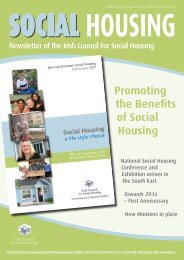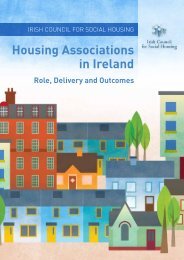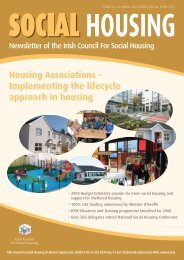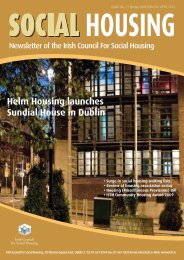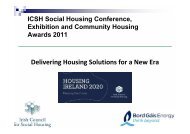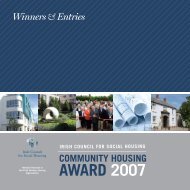National Housing Strategy for People with a Disability 2011 - 2016
National Housing Strategy for People with a Disability 2011 - 2016
National Housing Strategy for People with a Disability 2011 - 2016
Create successful ePaper yourself
Turn your PDF publications into a flip-book with our unique Google optimized e-Paper software.
message through a series of community <strong>for</strong>a meetings, local broadcasts, local print mediaand a range of other activities.9.42 A Sustainable Communities Fund was established by DECLG in 2007 to providefunding to local authorities on a project-by-project basis <strong>for</strong> initiatives that provide <strong>for</strong>housing renewal and improvement of the housing stock and living environments. To date,payments of almost €6.5 million have been made from the Fund, <strong>with</strong> payments of €1.285million made in 2010. The funding provides <strong>for</strong> projects in areas such as equality, diversityand special need initiatives as well as initiatives in the areas of supported housing, tenancysustainment and case management <strong>for</strong> people who face multiple challenges. The fundcontinues in <strong>2011</strong>, approximately 40 individual project applications are currently underconsideration <strong>for</strong> inclusion in the programme.9.43 The following case study is an example of a befriending service to support people<strong>with</strong> mental health disabilities <strong>with</strong>in the community.Case Study 9.3: North Dublin Befriending Service 90The North Dublin Befriending Service is a voluntary one to one support service, funded bythe HSE, <strong>for</strong> people who are living in the community and experiencing a mental healthdisability. Befriending is a relationship between a volunteer befriender and a befriendeewhich operates <strong>with</strong>in a structural framework. This is usually a time limited relationshipwhich enables a person to widen their own social network, increase independence andmake in<strong>for</strong>med choices, so enabling them to live life to the full. Befriending involvesmatching a person who has a mental health disability (befriendee) <strong>with</strong> a trained volunteer(befriender). The service is led by co-ordinators who provide the training, support,supervision and on going training. Volunteer befriending can play a valuable part inhelping someone who has experienced mental health difficulties alleviate the problem ofsocial isolation.Isolation is a common problem <strong>for</strong> people suffering from a mental health disability andresearch has shown that support and social interaction is vital to assist in recovery. TheNorth Dublin Befriending Service hopes to bring people together <strong>for</strong> positive, supportiverelationships that will reduce the isolation often felt by those <strong>with</strong> a mental healthdisability. The stigma around mental health disabilities can often mean that individualsstruggle to reach out to people around them. This can create a vicious cycle - wherepeople <strong>with</strong> mental health problems are isolated <strong>with</strong>in the community even though theyneed support and friendship to help them get well.90It should be noted that the North Dublin Befriending Service is an initiative which was initially funded by aDormant Accounts grant. At the end of the funding period the HSE took up the commitment to maintain thesupport to the North Dublin Befriending Service.118



